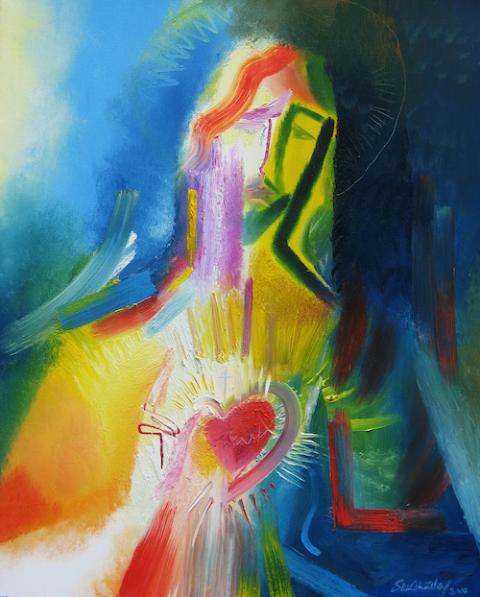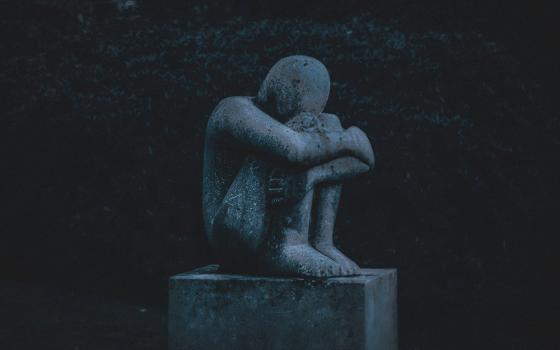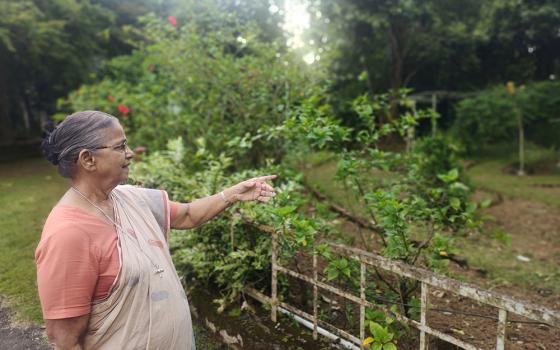
"Plaque with the Crucifixion" by Monvaerni, 15th century, Limoges, France (Metropolitan Museum of Art)
Admittedly, I have been wondering how in the world to put words together for this column. Then I realized: The date of this posting is the feast of the Sacred Heart of Jesus. The double-effect of this synchronicity is that first, it seems strikingly appropriate to focus on the wounded, loving heart of Christ at this current moment, and second, the Sacred Heart is probably my favorite topic of all to write about. Life. And love.
The heart of Jesus is a heart on fire with love for us, but it is also a heart broken from the rebuff received in response to that love, revealing an open wound. On the hill of Calvary, after Jesus had given everything he had to give for the redemption of humanity, including his life, we (in the person of the soldier at the foot of the cross) pierced through his heart with a final, decisive thrust of the spear, just to make sure he was really dead.
What happened as a result? "Immediately blood and water flowed out" (John 19:34). Take that in for a moment. In response to this ultimate rejection and violence, the response of the dead Jesus is to pour out blood, symbolizing his unconditional (unconditional!) love for us, and water, symbol of a rebirth, a washing clean, a baptism into a new life. The heart of Jesus, broken by our sins, shattered by our rejection, returns to us life and love. Life. And love.
Responding to violation and violence with love and new life in no way condones, trivializes, or eliminates the horror of the perpetrations. Every piece of Sacred Heart artistry reveals a heart that is both on fire and still wounded. Love poured out on the undeserving is neither weak nor naïve. Love poured out on the undeserving is reparative. The love of the Heart of Christ is poured out, even on the worst of sinners, not because sin is insignificant but because the sinner is worth redemption. "Making reparation" is the act of Jesus loving us even beyond his own death; it is the act of Jesus Christ not giving us what we deserve but what he has desired to give us for all eternity. Life. And love.
Advertisement
The body of Christ continues to bleed right now, pierced through by the violence of racism and injustice manifested on our streets, in our legislation, and in our personal lives. The heart of Christ remains broken, wounded by the silence of the complicit, battered by the hate and evil that continue to beleaguer the most vulnerable of our brothers and sisters. The Brown and Black members of the body of Christ are suffering, and when any member hurts, the whole Body is in pain. How are we to respond to this aching, broken-heartedness of Christ? Life. And love.
Recently, civil movements demanding that the dominant classes "make reparation" are beginning to abound. What does that mean: "make reparation"? After both world wars, Germany (among others) had to make reparation in the form of financial reimbursements for civilian damages effected during the war. Why reparation? Because something heinous occurred, the offense was universally recognized and acknowledged, and a response of remorse, repayment and correction was demanded. Conceptually, theological reparation works in much the same way. On Calvary, something heinous occurred, God recognized the evil perpetrated on the innocent one of Jesus Christ, and the "repayment" or restitution demanded came from the response of the broken heart of Christ — blood and water. Life. And love.
Our times call us as Christians to make reparation. Something heinous continues to occur when the loss of Black and Brown lives doesn't seem to matter all that much, when some members of the body of Christ are privileged differently just because of skin color. Restitution is demanded; reparation is required. What might it look like? Life. And love.

The Sacred Heart of Jesus is depicted in a painting by London-based Stephen B. Whatley. (CNS/Stephen B. Whatley)
On this celebration of the Sacred Heart of Jesus, I propose that the kind of reparation required of us right now is the reparation modeled for us by the heart of Christ on Calvary. On that hill, the body of Jesus Christ was broken in every possible way — beaten, mocked, tortured and killed. And then, just to be sure, he was stabbed right through the heart. In pouring out Life and Love on the perpetrator, the body of Christ did not condone violence; the heart of Christ washed over violence with love and a new way of living. And in so doing, the perpetrator became a disciple. Life. And love.
This may seem too good to be true, and I admit, even as I write it I question whether it really is possible. But so many who have come after Jesus have shown us that it is possible for the body of Christ, broken and bruised, to still return life and love, even to those who assault it: Nelson Mandela, Mother Teresa, Martin Luther King Jr., Dorothy Day, Gandhi. Their responses were not determined by skin color, ethnicity or even necessarily creed. The responses of these awe-inspiring figures were determined by Love. Life. And love.
So may ours be, today and every tomorrow to come.
[Virginia Herbers is an Apostle of the Sacred Heart of Jesus who is director of spiritual formation at St. Louis University. She has a master's degree in pastoral studies and has ministered in education at both the elementary and high school levels in Connecticut, New York, Missouri and Taiwan.]






